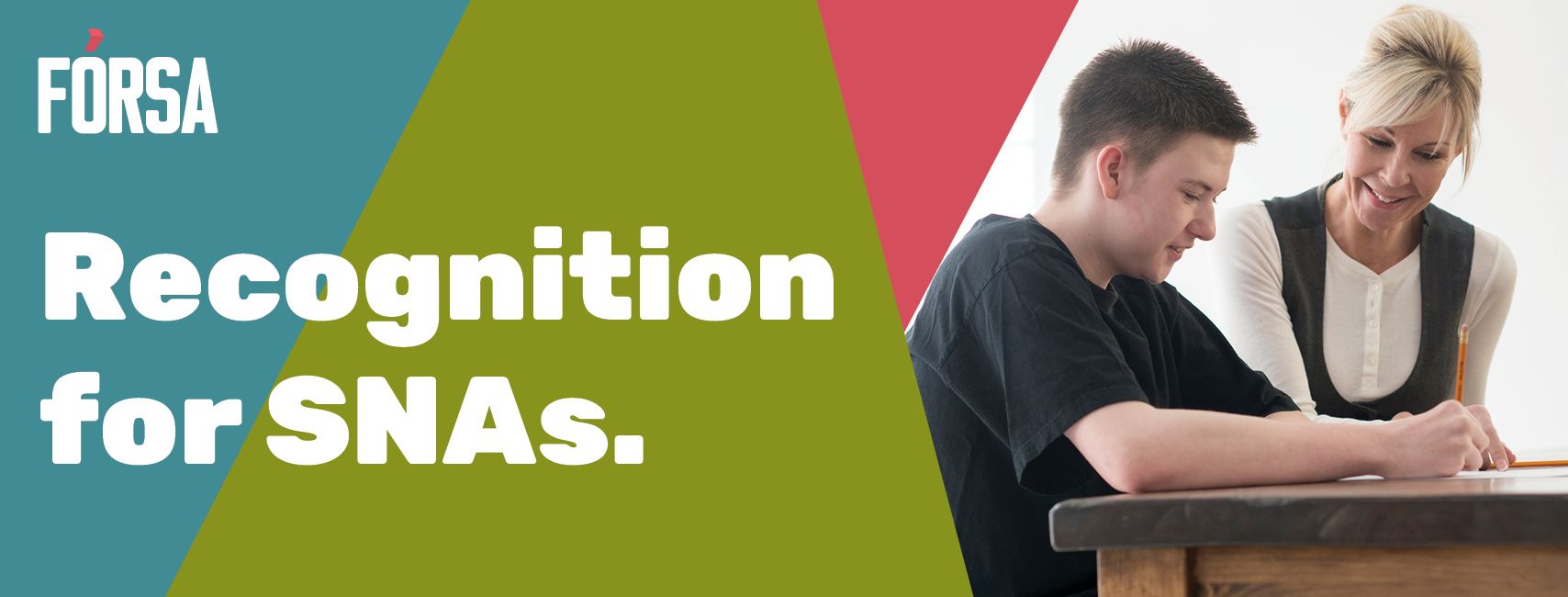Fórsa to lead social media and lobbying campaign to gain recognition and respect for SNA role
Fórsa is to commence a new national campaign to highlight the value of the role of special needs assistants (SNAs), following the Department of Education’s refusal of a union claim for a new minimum qualification for SNAs, which has not been altered since the introduction of the ‘Childcare Assistant’ scheme in 1979.
The union had sought a relevant QQI level six qualification, or the equivalent, to be essential criteria when new SNAs are hired. Many schools already seek a level six qualification, and don’t appoint new SNAs unless they at least hold a level five QQI award.
In a letter sent to the union late last week, the department stated that the current educational requirements do not need to be changed. In its submission to the Workplace Relations Commission (WRC), Fórsa said Ireland is out of step with international standards for the qualifications required from SNAs, as many other countries require candidates for SNA posts to have a college diploma or certificate equivalent to a level six qualification.
Fórsa said Ireland is out of step with international standards for the qualifications required from SNAs.
The union’s head of education, Andy Pike, said the union’s 12,000 SNA members will now take part in a new campaign, starting this week, to gain recognition and respect for the role of SNAs by establishing a qualification for new entrants to the job which reflects the complexities of the role.
He added: “The refusal of this claim by the Department of Education demonstrates lack of respect for SNAs and the essential work they carry out in our schools.”
Mr Pike said the department did concede that a review might be necessary at some point in the future, given the length of time since the qualifications were set: “But the department hasn’t committed to any timescale, nor does it accept that a level six qualification is desirable, preferring instead to leave decisions to individual schools.”
The first stage of the campaign will take place on social media, promoting a clear message on the need to respect SNAs throughout the summer months, to raise awareness of the need to review and change the minimum SNA qualification. The campaign will seek support and endorsements from parents associations, boards of management, school principals, teaching unions, advocacy groups and other stakeholders.
“The next phase of the campaign will commence at the start of new term in September, when our members will lobby elected representatives to endorse the campaign, along with a series of planned public events,” Mr Pike added. In its submission to the WRC, Fórsa highlighted that the minimum educational qualification for SNAs has not been reviewed or changed since the statutory SNA scheme was first established. Mr Pike said “The origins of the current minimum qualification date back to the introduction of the Childcare Assistant scheme within schools in 1979.
The refusal of this claim by the Department of Education demonstrates lack of respect for SNAs and the essential work they carry out in our schools.
“Since then the role of the SNA has undergone considerable changes which have not been reflected in the minimum qualification. Fórsa presented evidence demonstrating that the overwhelming majority of current SNAs have educational achievements well above the current requirement for three passes in the Junior Certificate.
“Many SNAs hold qualifications at degree level, and most have achieved at least a level six qualification. More than 60% of the 500 SNA students on the current UCD training course have already achieved a minimum qualification of level six,” he said.
Mr Pike said that the department has informed Fórsa that it would not be reviewing a decision not to accredit the UCD training course until the current students complete the programme. He added: “This means that 500 SNAs will complete the course without receiving an accredited UCD qualification. However, programmes for groups such as healthcare staff, social care staff and teachers are routinely accredited.
“UCD has stated the SNA training course should be accredited at level six or level seven, yet the Department of Education refuses to give SNAs the recognition they deserve for completing the programme,” he said.
The union sent a special bulletin to its SNA members yesterday (Tuesday) to inform them of the department’s decision, to rally support for the campaign, and distribute campaign materials.

